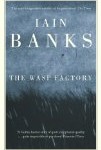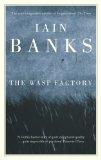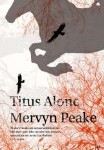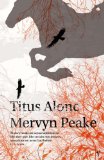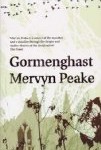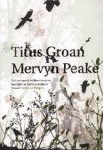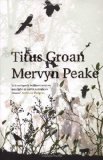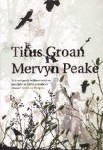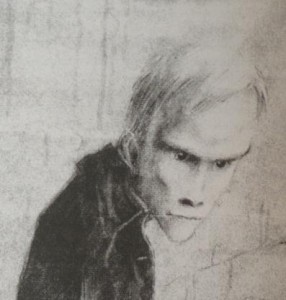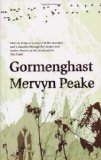
Gormenghast
Thirty-Eight – Fitfty-Eight (p565 – p659)
.
.
.This week’s Gormenghast discussion is written by Falaise from 2606 Books and Counting. He is a blogger who, given the average life expectancy of a British man, realised that he will probably only manage to read 2606 books in the rest of his life. He is prioritising the important ones by working his way through 1001 Books: You Must Read Before You Die.
Jackie has very kindly allowed me to barge into her blog to share some thoughts on this third week of the Gormenghast segment of the Gormenghast Read-along. It’s a good week to have this opportunity as it’s been spectacularly eventful in the book, with Steerpike taking centre stage once again.
 I’ve always pictured him as being pale, sinuous, almost serpentine in appearance but, over the past couple of weeks, another image has been elbowing its way into my mind. You see, I am starting to have these flashes of seeing Steerpike as a villain from the days of silent movies, the kind who wears an opera hat, black cloak and an outré moustache. I know it’s wrong. I know he is far more evil and complex than that, but his journey from ambition to Technicolor sadist has been so dramatic and complete that I just can’t help it.
I’ve always pictured him as being pale, sinuous, almost serpentine in appearance but, over the past couple of weeks, another image has been elbowing its way into my mind. You see, I am starting to have these flashes of seeing Steerpike as a villain from the days of silent movies, the kind who wears an opera hat, black cloak and an outré moustache. I know it’s wrong. I know he is far more evil and complex than that, but his journey from ambition to Technicolor sadist has been so dramatic and complete that I just can’t help it.
When we first met him in Titus Groan, Steerpike was an escapee from Swelter’s hellish kitchens, characterised more by a strong survival instinct than by anything else. Now, however, with the slayings of Barquentine and Flay, his treatment of the twins and his twisted pursuit of Fuchsia, his descent into evil is complete. Fortunately, this has also coincided with his unmasking as a traitor and Fuchsia’s realisation of his true nature.
All this seems quite straightforward, inasmuch as anything in Gormenghast Castle can be straightforward, but there are a few nagging questions that I haven’t quite got my head around. Firstly, the death of Cora and Clarice doesn’t seem to be quiet as clear cut as I had originally thought it. We are told that Steerpike stops visiting and that they starve to death, with only their final wails and screams heard by Flay. It’s shockingly cruel and the implication is obvious. Steerpike has murdered them. But, hold on. We later find out that Steerpike has been sick in bed for weeks, after his killing of Barquentine. So, maybe he hadn’t really intended them to die, even though they only succumbed to starvation a couple of days after he was up and about. I still think he is ultimately responsible but am not sure whether this was a cowardly crime of omission (by failing to alert anyone to their predicament) or a cruel crime of commission (locking them away, intending that they should starve).
What do you think about this? Did Steerpike want them dead? Or was he just indifferent to their fate? And, if so, does it make any difference to our view of him?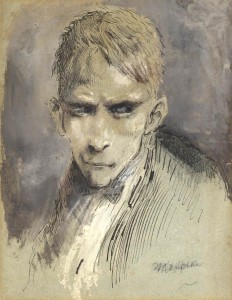
There’s also the question of Steerpike’s physical appearance and emotional state and whether there is a relationship between them and his level of moral turpitude. At the beginning of Titus Groan, Steerpike is a flatterer, a manipulator, even an arsonist by proxy, but not a killer. During this phase of his career, he is described as being strong and lithe, almost an athlete. His killing of Sourdust was accidental, although he was quick to capitalise on it but, after his murder of Barquentine and of the twins, his appearance has been terribly damaged by fire, he is scarred both physically but also emotionally, as his reaction to Fuchsia’s candle shows. I can’t help but think of Oscar Wilde’s The Picture of Dorian Gray here and the decay of Dorian’s picture as his character is degraded.
Do you think there is a conscious relationship between Peake’s description of Steerpike’s physical and emotional well-being and his moral condition or am I reading waaay too much into it?
I’m not going to dwell too much on the underlying themes of ritual and tradition versus change and freedom this week, save to point out the very different ways in which Steerpike and Titus embody the tension between them. Both are seeking to break out of the confines in which Gormenghastian law would bind them but in very different ways. Steerpike wants to bend and rework tradition to his aims to increase his power and to break into the privileged part of traditional society to usurp the legitimate rulers. By contrast, the actual ruler, Titus, is beginning to realise that he is no different to his class mates and to resent the rules that will govern his life. He wants to overthrow tradition to find personal freedom and to cast off responsibility.
Leaving aside Steerpike’s methodology for achieving his ends, are Titus’ aims really any better than Steerpike’s? Is it right that he should want to abdicate responsibility for the people of Gormenghast? Is this “just” a phase of childhood and a sign of growing up?
I am finding Gormenghast to be an even more enjoyable read than Titus Groan and can see why it is generally accepted to be Peake’s masterpiece. The castle, which, arguably, was the star of the first book, has stepped back to be a rich backdrop to the central drama of the castle’s inhabitants. Unlike many authors, Peake is definitely not scared of killing off key characters and is deft at rounding out and developing other characters, notably the Countess. It is rapidly becoming one of my favourite reads for a very long time.
I do have one issue with it though and an admission to make. I can see the point of having some school scenes in the book. I find Irma Prunesquallor amusing comic relief, especially in Doctor Prunesquallor’s reactions to her. I am, however, struggling to see any meaning in the Bellgrove-Prunesquallor romance and marriage, other than as part of Peake’s surprising comedic tendencies.
Am I missing something here? What do you think Peake was trying to do with this strand of the novel? Have you been surprised at the amount of humour in an otherwise dark book?
Many thanks to Falaise for creating such a thought provoking discussion!



